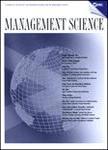-
作者:Chen, Yiwei; Ozer, Ozalp
作者单位:University System of Ohio; University of Cincinnati; University of Texas System; University of Texas Dallas
摘要:This paper determines categories of contracts that facilitate vertical information sharing in a supply chain while precluding horizontal information leakage among competing newsvendors. We consider a supply chain in which retailers replenish inventory from a common supplier to satisfy uncertain demand and are engaged in newsvendor competition. Each retailer has imperfect demand information. Yet one of the retailers (the incumbent) has a more accurate demand forecast than the other (the entrant...
-
作者:Chiang, Yao-Min; Lowry, Michelle; Qian, Yiming
作者单位:National Taiwan University; Drexel University; University of Iowa
摘要:Using a unique data set of dealer-level trading data in bookbuilding initial public offerings (IPOs), we find strong evidence that lead underwriter trades in IPO firms are significantly related to subsequent IPO abnormal returns. This relation is concentrated among issues in which underwriters' information advantage is likely greater, specifically among IPOs with higher information asymmetry or subject to higher investor sentiment and among underwriters with the most industry experience. In co...
-
作者:Huang, Guofang; Luo, Hong; Xia, Jing
作者单位:Purdue University System; Purdue University; Harvard University; Harvard University
摘要:Pricing products such as used cars, houses, and artwork is often challenging, because each item is unique, and the seller, ex ante, lacks information about the demand for individual items. This paper develops a dynamic pricing model for products with significant item-specific demand uncertainty, in which a forward-looking seller learns about the item-specific demand through an initial assessment, as well as during the selling process. The model demonstrates how seller learning, through several...
-
作者:Jeong, Martha; Minson, Julia; Yeomans, Michael; Gino, Francesca
作者单位:Harvard University; Harvard University
摘要:When entering into a negotiation, individuals have the choice to enact a variety of communication styles. We test the differential impact of being warm and friendly versus tough and firm in a distributive negotiation when first offers are held constant and concession patterns are tracked. We train a natural language processing algorithm to precisely quantify the difference between how people enact warm and friendly versus tough and firm communication styles. We find that the two styles differ ...

